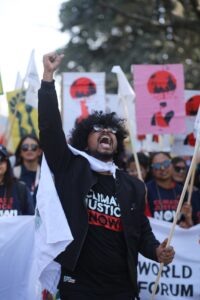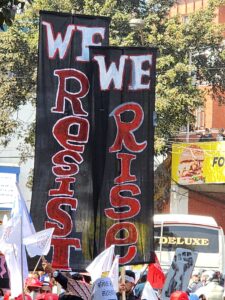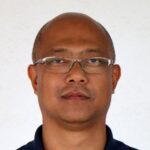Minds of the Movement
An ICNC blog on the people and power of civil resistance
by Maneesh PradhanNovember 12, 2024
I've often pondered what motivates someone to risk their freedom, safety, and even their life for the sake of rights and justice. Why do they persist when the fight seems endless? What sustains them when fear and exhaustion threaten to take over? The “Voices of Resilience” blog series seeks to explore these questions through the personal activism journeys of five remarkable women human rights defenders from Southeast Asia.
When I set out to commission this series, I wasn’t sure I would find activists willing to write their stories in their own words. Writing in English often poses a challenge for many frontline activists in Southeast Asia, and I wanted their raw, authentic voices – not academic analyses. Fortunately, at the World Social Forum in February 2024, I met some amazing young activists from the Milk Tea Alliance who connected me to potential women human rights defenders eager to share their stories. I’m deeply grateful to the five extraordinary frontline defenders who contributed.
Initially, I expected to be a neutral observer who would support the bloggers solely as an editor. But as I listened to these women, I found myself deeply moved. Their stories were raw, and their resilience palpable. These women are not just activists; they are daughters, sisters, mothers, and friends who have faced personal tragedy, persecution, and forced exile but have refused to give up. What began as a focus on young female activists grew into an intergenerational narrative, uniting women from their twenties to their seventies, all bound by the same fierce commitment to justice.
Why activism becomes a calling
For many human rights defenders, activism isn’t something they choose, it chooses them. Personal grief often shapes their journeys, as it did for Nilda from the Philippines, who lost two brothers to political violence, fueling her decades-long fight for human rights. For many, this grief stems from violence by state forces, gender-based abuse, or witnessing injustices that cannot be ignored. In such moments, activism becomes more than a cause; it becomes survival, a way to reclaim dignity for themselves and their communities. What sets these defenders apart is their ability to channel deep personal pain into a relentless drive for change. This transformation of suffering into collective action defines their resilience, allowing them to push forward despite threats, intimidation, and exhaustion.

World Social Forum, 2024. Credit: Author.
The path to activism is deeply personal, often beginning with a single act of defiance that grows into a collective movement for justice. For Memee, a young activist from Thailand, this journey began when a fellow activist disappeared – which galvanized her to join protests and advocate fiercely for democracy and gender justice. Many, like Memee, find their political awareness awakened by deep personal experiences of injustice. Activism then becomes not only a means of survival but also a way to reshape the future, a refusal to allow the next generation to endure the same injustices. In this sense, resistance becomes an act of love - for family, community, and a vision of a world free from oppression.
What’s remarkable is how these human rights defenders find strength in solidarity, even in the face of overwhelming challenges. Their activism is an act of radical hope – a refusal to accept the status quo. Even when civic spaces shrink and authoritarian regimes seek to silence them, once you’ve experienced injustice and witnessed a loved one fall to it, doing nothing becomes an unacceptable option.
Resistance belongs to all

Credit: Author.
For women human rights defenders, activism comes with immense risks. These women face threats not only from oppressive regimes but also from patriarchal mindsets within their own communities. Surveillance, harassment, and arbitrary arrests drive many into hiding or exile to escape persecution – such was the case for two contributors to this series, Ei Mon and Yin Lae from Myanmar. The threat of gender-based violence, particularly sexual violence, compounds the fear that shadows them, even in moments of rest. Yet, despite these overwhelming risks, they persist—knowing that turning back would only reinforce the silence they are determined to shatter.
In addition to physical risks, women activists must also contend with gender stereotypes and cultural expectations. Men, and sometimes other women, frown upon women’s participation in movements. This compels women to challenge both external repression and the biases of those around them. Even within activist movements, gendered hierarchies persist, with male counterparts suggesting that women stay away from dangerous activities, implying that their presence is a liability. Yet these women persist, proving – again and again – that resistance belongs to all, regardless of gender.
Activism has a significant emotional cost. Burnout and mental health issues are common among activists who bear the weight of their causes along with their sorrow and loss. Their journey can feel isolating, exacerbating struggles with identity, purpose and belonging. The fight for justice never truly ends; even in moments of relative calm, the mental burden persists.
The digital age brings new layers of vulnerability. Activists face online harassment and backlash—threats and slander weaponized against them, often targeting their gender and personal lives to silence them. This harassment complicates their struggle, as the very tools they use for organizing become sources of attack.
Sustaining hope in adversity

Credit: Author.
What sustains these women human rights defenders, despite overwhelming odds, is a mix of personal resilience, unwavering solidarity and hope for a brighter future. Their belief that their hardships are part of a broader, cross-cutting fight for justice serves as their driving force. In times of despair, the awareness that they are not alone and that countless others stand with them gives them strength. Solidarity is their shield. In their shared grief and collective rage, they find the strength to rise, again and again.
Creative expression provides an essential outlet for many human rights defenders, helping them process their experiences while raising awareness and building community. For Evy, our contributor from Indonesia, creating zines and art became a form of solace - a way to channel her activism into powerful visual storytelling. By sharing their journeys through art, defenders like Evy empower themselves and connect with others facing similar struggles. This creativity fosters resilience and strengthens their commitment to the fight for justice and equality.
A sense of purpose that transcends personal struggles is at the heart of their enduring efforts. They view activism as a continuous journey marked by progress, however slow. Their stories remind us that change rarely occurs overnight and that every effort, no matter how small, contributes to a larger movement for justice.
Their experiences show that activism is not just about opposing injustice; it is also about building a future where equality and dignity flourish for all. Each blog in the Voices of Resilience series offers a glimpse into these women's lives, showcasing their challenges, strategies and enduring hope. As we conclude this series, I encourage you to delve into their stories and stand in solidarity with their struggles.

Maneesh Pradhan
Maneesh Pradhan, based in Nepal, is the Asia Regional Coordination Lead at ActionAid International. He is Guest Editor of the REACT mini-series, “Voices of Resilience: Struggles and Triumphs of Women Human Rights Defenders in Southeast Asia”. He is a passionate advocate for harnessing “people power” to challenge and transform injustices.
Read More